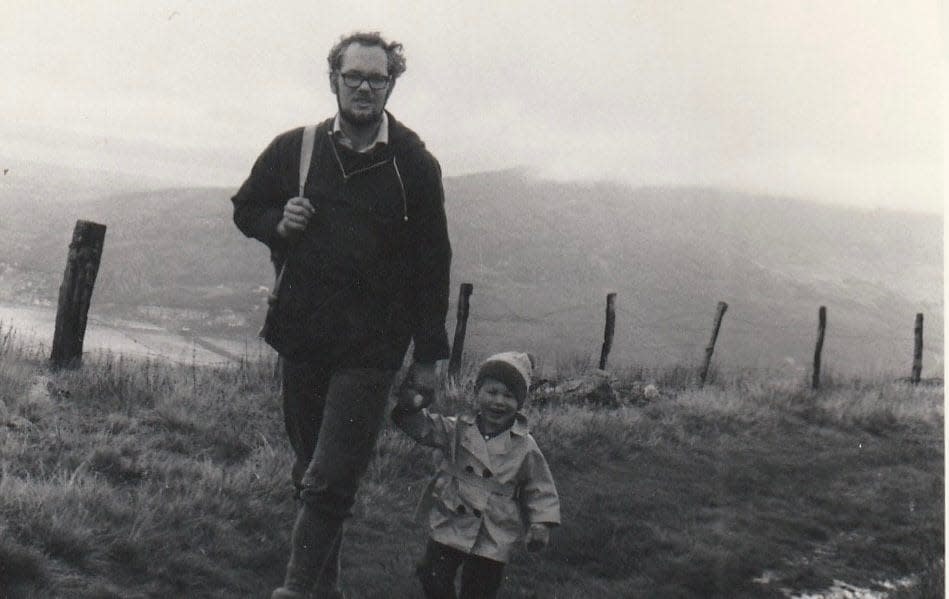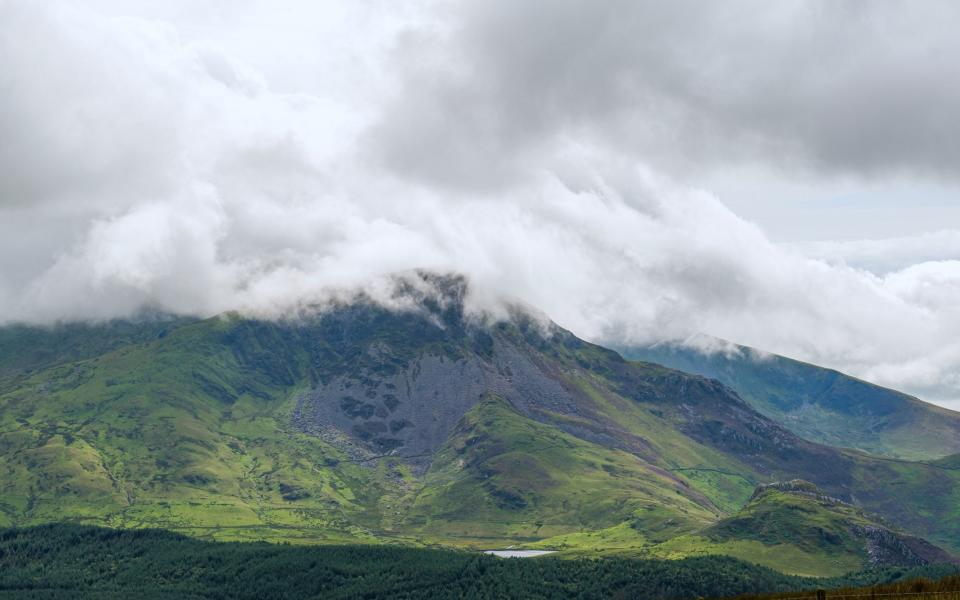After losing my father, there was only one place I could confront my grief

When my two brothers and I were children, we spent every holiday in the wuthering Welsh hills, where the narrow lanes have a mohican of grass, trees are jack-knifed by the wind, and the landscape appears to have been hastily covered in a green baize cloth. The colours are spinach green and pencil grey, and the standing stones accentuate the wilderness like exclamation marks.
Our hillwalking was powered by my father’s force-of-nature enthusiasm and slabs of Kendal mint cake. John Hole, my dad, loved many things: theatre, writing, people, chocolate Hobnobs, and the enveloping, exhilarating splendour of the mountains.
My father died in February of pneumonia. So it was in his honour that we found ourselves, on our first fatherless Father’s Day, climbing a Welsh mountain. He would have loved it, and one of the most painful things en route was not to receive his regular phone calls as we made the trip, telling us how chuffed he was.

Grief is still a thing I drag around. It sometimes catches on things and stops me in my tracks, winding me. It’s a lonely road, despite the crowds stumbling along beside you. My grief is knotty, an unrescuable tangle, like a lump of string you find at the back of a drawer. We were close; we were distant. My parents divorced when I was a teenager and my dad moved to Scotland with his second wife, but he used to see us as often as he could.
Then, the pandemic trapped us apart like insects paralysed in amber. He was in hospital during the period when visitors were forbidden. That I couldn’t visit, that he died alone, haunts me. Of this, he would not approve: “Concentrate on the living,” he would say. It’s hard to comprehend that he is gone. I have been catapulted back into being a child, and feel somehow lost.
But I find solace in the places he loved. Aged 19, my dad had been part of a joyous month-long scientific expedition around the Shiants Isles (off the coast of Lewis). He saw the Northern Lights (he wrote in his diary, “the sky looks like an under-developed scratched negative”); and communicated with the mainland via crackly radio. Post was dropped by an RAF Hercules. He was in charge of Morse code, signalling when the group needed supplies (“USE ANTS” was the gnomic Baden Powell-based response when they asked for sugar).
He was hooked on our great outdoors: he loved the Lake District, Scotland, and, most of all, North Wales. I remember the feeling of travelling there at night in the back of the car, my dad driving, seeing the dark bulk of the star-lit mountains, feeling very small and very safe.
We usually headed to my uncle’s holiday home, Cyfannedd Fach – an exposed yet sheltered cottage that my grandparents and uncle discovered as a ruin and the family rebuilt. It’s several turns of the road further than you think anyone may go, and dates from the medieval period, with its metre-thick walls. There are eight gates – used to divide sheep – between Cyfannedd and Dolgellau, a stolid grey-stone town we used to visit to peruse the mountaineering shop, and trail around with Dad as he stocked up on lightbulbs and string at the old ironmongery, TH Roberts. The shop retained all its Victorian shopfittings and the service was never speedy – each item was brought out tantalisingly slowly from a specific polished wooden drawer. Sadly, TH Roberts closed down, but the interior has been preserved in what is now Dolgellau’s most popular café, serving slabs of cake.
Above the town, Cader Idris broods, a perpetual reminder of our ant-like insignificance. Legend has Idris as a giant, with “cader” meaning “seat”, and it is said that if you sleep there the night you’ll end up either mad or a poet. The large boulders on the lower slopes are said to be the debris of stone-throwing battles between Idris and other giants. The rock here is volcanic, pillow lava, and the cliffs still bear traces of glaciers. There are blanket bogs, wild angelica, foxgloves, hare’s tail cottongrass, and glass-clear lakes of cold, metallic blue.

I don’t remember ever questioning the need to climb or walk the area as a child. Mornings were spent perusing Ordnance Survey maps that billowed out over the toast crumbs as my dad pondered where we should go. His kit comprised a compass, carabinas, brown dubbin-polished walking boots with red laces, and, in the early days, plus fours. I knew our preferred local routes: for Cader, up the Pony Track and down the Fox’s Path – the latter a steep scree slide.
After climbing Cader, we would go to the George III (georgethethird.pub), an inn and sometime railway station reflected in the coot-dotted mirror of the Mawddach Estuary. The inn has a poem in its visitor’s book by Gerard Manley Hopkins: “The Mawddach, how she trips! Through throttled/If floodtide teeming thrills her full,/And mazy sands all water-wattled.”
At the time, I was only vaguely aware of the wide flat sandy beach at Barmouth. Crossing the 19th-century estuary toll bridge usually meant heading for Precipice Walk or New Precipice Walk, and only when the drizzle was too profound to attempt a mountain. Both these trails are fairly flat, but have views over the snaking estuary, backed by the billowing watercolour greys of Cader Idris. The last time I walked here with him, Dad led the way, Gore-Tex-clad, only his glasses exposed to the rain, while my boyfriend and I followed, drenched and hysterically laughing at the contrast in our preparedness.
Further north, we would often camp in leaky tinker tents in a farmer’s field in order to climb Tryfan, the most cartoonishly pointed of all the Welsh mountains, glowering above us. You have to scramble, using your hands, all the way to the top. This was also the launchpad for the Snowdon Horseshoe, and Dad would drive the six hours from London to walk the seven-hour route alone. He would start with the serrated knife edge of Crib Goch, where precipices drop away on either side. As a teenager, he told us, he had once walked along it with his hands in pockets, then the next day, after trading gung-ho tales of mountain accidents, crawled the same route on hands and knees.
But it was Snowdon that my brothers and I decided to climb in his memory. As we so often travel to mid Wales, we felt we should go further north for this commemorative walk – to return to a place that we hadn’t been for decades. We met, still caught in the headlights of grief, on a clear evening in June, at Betws-y-Coed, amid the Alpine, tree-knitted splendour of Snowdonia. We wandered through the town, slipping into well-worn sibling roles as we wandered over the town’s Pont-y-Pair (“bridge of the cauldron”), waterfalls foaming beneath it. We clambered across the rocks beneath the bridge, and sat overlooking the bubbling pools and crashing water as other visitors took selfies and the sun smeared the sky pink. By comparison, we felt oddly nervous for the next day.
We opted to walk the Pyg Track – an acronym of Pen-y-Grwd – because it begins beside another favourite place of Dad’s, the ivy-wrapped hotel (pyg.co.uk) that hosted those training for the 1953 ascent of Everest. We used to sit here for the essential post-walk pint, next to a roaring fire and in the wood-panelled bar where there are the signatures of Edmund Hillary and Tenzing Norgay on the ceiling.

My brother, Ben, picked up three stones at the bottom. “For the cairn at the top,” he said.
“I didn’t realise that was a thing,” remarked Joe, our younger brother.
“It’s a Dad thing,” Ben replied.
We pocketed the rocks and started to walk. It was hard going, and steep. My brothers, fitter than me, powered ahead. I contemplated that I could die. My bag was heavy. I had packed far too many jumpers.
It was only when the incline subsided, and the views opened like a book, that I was hit by the memory of how things were. This was what made climbing a mountain so pleasurable; the rhythm of the walk, the haul and then the pause to survey the sweep of the land from the top of the world. We looked down on the Prussian-blue lake, the grey stone streaked with marble like lightning bolts. There were small puffs of sheep’s wool caught on the heather, like snowdrops.
For a fleeting, wonderful moment, I had found my dad. He was in the ground beneath our feet, in the ground that he had walked. He was in the views over the silvering Mawddach Estuary where we planted a tree to him in the summer, while tragi-comically dodging a trillion gnats.
He was in the memories of maps and boots, and back-of-envelope lists. He was in the rocky spine of Crib Goch, which he sauntered over long before I was born.
Reaching the ridge, the number of people climbing alongside us began to build. Gaggles were joining the path to the top from the other route, beside the mountain railway line. It felt good to be toiling towards the same end as these others – an arguing couple, an elderly man with walking poles, a runner in shorts, a stream of unlikely pilgrims. Reaching the chill wind of the summit, we put our stones on the pillar that marks it, and then added them to the cairn. And we agreed to climb again next year. Every year.
It felt like balm for my wounds; the wild openness, the permanence of the landscape, and the memory of trudging uphill with Dad at my side, advising me: “Don’t look at the mountain yet to climb, just the little bit ahead.” In the apex of our grief, we had searched for some peace, and found it in the place that our father loved.

